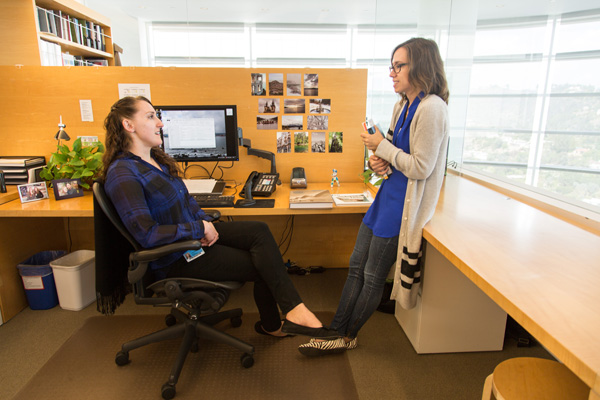
Luann Manning (left) and Sara Powers (right) discuss logistics for a Conserving Modern Architecture Initiative event.
At the Getty Conservation Institute, there are currently 24 field-based projects—projects in which staff members work at remote locations for weeks at a time in parts of the world that are generally not easily accessible. Managing the logistical details that allow our teams to work at these locations is the work of a dedicated group of senior project coordinators.
As a senior project coordinator and supervisor at the Conservation Institute, I oversee the work of five other senior project coordinators. The six of us serve as the administrative arm of the Institute’s field-based projects. While not conservation practitioners ourselves, we share a passion for history and cultural heritage preservation. We have undergraduate and graduate degrees ranging from history to archaeology to art history to political science, and a wide range of professional experience. We share a strong attention to detail, a trait essential to managing complex budgets, contracts, and numerous international project partners.
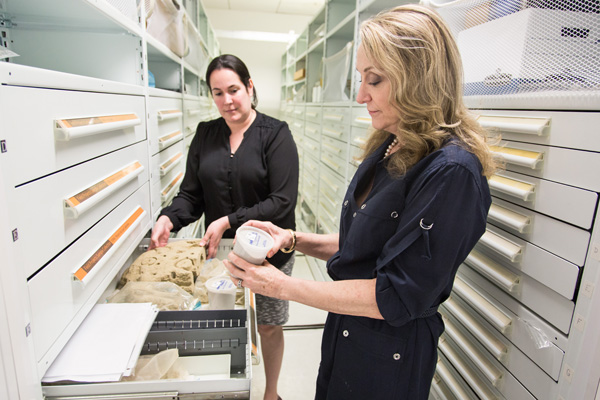
Maria Cummings (left) and Micaela Shea (right) browse through the sample collection database for field-based projects.
Preparing for Departure
Among the many challenging aspects of our job is planning logistics for field campaigns that typically span between two and eight weeks. A project coordinator’s work begins with researching local history and customs to better aid staff when they are in the field. We organize local and international flights, book lodgings, arrange transportation, and process visas. We order specialized equipment and supplies and often process complicated shipping forms in order to transport supplies across countries. We also work with vendors and partners at the location to organize events on site.
Beyond logistical arrangements, we also manage complex multiyear contracts and assist with producing campaign reports and course materials. All of this gives us a solid understanding of the fieldwork taking place during a campaign.
In the Field, from the Atlas Mountains to the Peruvian Andes
The Conservation and Rehabilitation Plan for the Kasbah of Taourirt and the Seismic Retrofitting projects are great examples to illustrate the complexities we face in planning remote-location campaigns.
The Kasbah of Taourirt is located in Ouarzazate, Morocco. Due to the remoteness of the site, travel from Los Angeles can often take between two and three days. Flight schedules are limited and delays can result in a missed connecting flight, with the next flight not scheduled for another two days. When that happens, the coordinators make last-minute arrangements for staff to travel the remaining distance by bus, train, or car—a trip that crosses the Atlas Mountains and takes almost a full day.
We coordinators also arrange for specialized conservation equipment to be transported. Because there are very limited resources on site for the necessary equipment, we purchase supplies in Los Angeles, which staff then bring with them. We order these supplies from a variety of specialized vendors in the United States and work with the project team to develop a plan to get materials to the site.
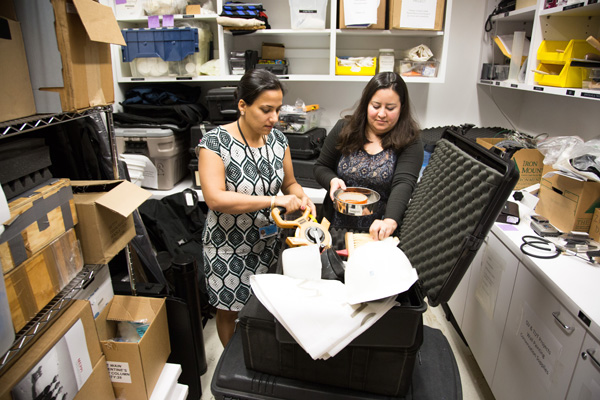
Ayda Haghighatgoo (left) and Lucinda Schell (right) organize equipment for an upcoming campaign.
Because the majority of field project-based work takes place internationally, fluency in a foreign language is an important skill many of the coordinators share. In Ouarzazate most people speak only French, Arabic, or Tamazight, including our project partners and consultants from the area. The coordinator for this project makes the majority of her travel and logistical arrangements in French.
For the Seismic Retrofitting Project, located in the Peruvian Andes, the senior project coordinator corresponds with consultants and project partners and organizes travel arrangements primarily in Spanish. This location is so remote that staff usually camp at the site, which requires the coordinator to order and ship camping equipment to this remote location.
At Home Base
A senior project coordinator’s responsibilities continue even when the project team is securely settled on location—in Morocco, the Peruvian Andes, Tunisia, Myanmar, or beyond. We maintain constant contact with the project team, make last-minute logistical changes as the campaign takes place, and play pivotal roles when emergencies occur, as they often do.
Planning logistics for an international field campaign is truly a challenging responsibility and the success of the campaign depends on our work. Our coordinator group relies on each other and our individual expertise to successfully see these campaigns through from creation to completion. Organizing these campaigns is quite rewarding and only one aspect of our challenging role as senior project coordinators.
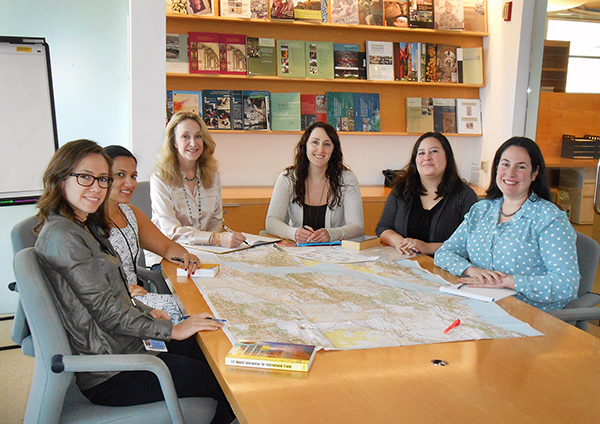
The senior project coordinators for the Conservation Institute’s field-based projects.

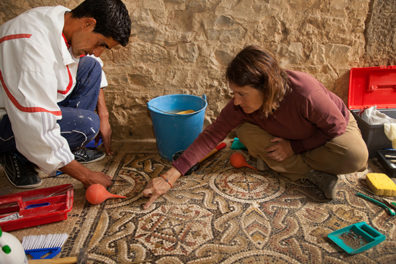

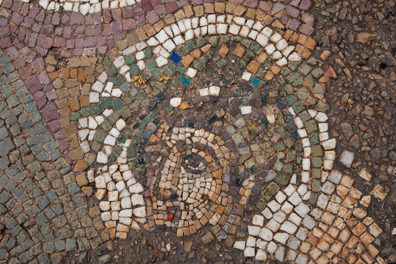
All that is described here sounds absolutely amazing and definitely a dream job! I hope one day I can make my way into this field!
I’m sure the conservators truly appreciate all the coordination and preparation that goes into their projects abroad. Projects that have made the Getty renowned internationally wouldn’t exist without a team like you!